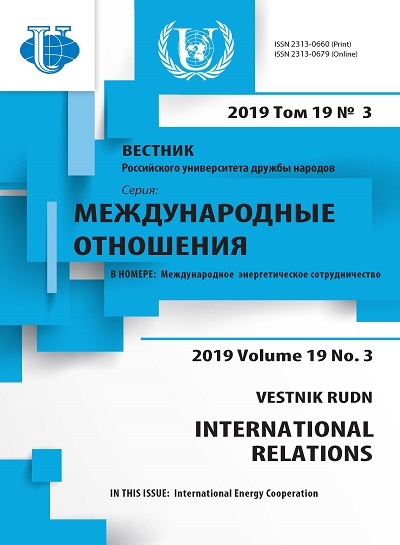Assessing the Obstacles of Regional Integration in the Horn of Africa: the Case of IGAD
- Authors: Gardachew B.D.1, Kefale G.M.1, Antigegn G.K.1
-
Affiliations:
- Bahir Dar University
- Issue: Vol 19, No 3 (2019): International Energy Cooperation
- Pages: 432-438
- Section: INTERNATIONAL ECONOMIC RELATIONS
- URL: https://journals.rudn.ru/international-relations/article/view/22592
- DOI: https://doi.org/10.22363/2313-0660-2019-19-3-432-438
- ID: 22592
Cite item
Full Text
Abstract
About the authors
Bewuketu Dires Gardachew
Bahir Dar University
Email: bewuket23@gmail.com
Assistant Professor and Researcher, Department of Political Science and International Studies Bahir Dar, Ethiopia
Gebeyehu Mengesha Kefale
Bahir Dar University
Email: 23addisgb@gmail.com
Assistant Professor and Researcher, Department of Social Anthropology Bahir Dar, Ethiopia
Getahun Kumie Antigegn
Bahir Dar University
Email: getkumie@yahoo.com
Assistant Professor and Researcher, Department of Political Science and International Studies Bahir Dar, Ethiopia
References
- Abdi, A. & Seid, E. (2013). Assessment of Economic Integration in IGAD. The Horn Economic and Social Policy Institute (HESPI). Policy Papers, 13/2.
- Alemayehu, G. & Haile, K. (2002). Regional Economic Integration in Africa: A Review of Problems and Prospects with a Case Study of COMESA. University of London.
- Asante, S. (2001). Africa and the Challenge of Globalization: Agenda for Action. South African Journal of Economic and Management Sciences, 4 (3), 476-492.
- Bolaños, A. (2016). A Step Further in the Theory of Regional Integration: A Look at the Unasur’s Integration Strategy. GATE Lyon Saint-Étienne Working Paper.
- Byiers, B. (2016). The Political Economy of Regional Integration in Africa. Intergovernmental Authority on Development (IGAD).
- Fantu, C. (2002). African Renaissance: Roadmaps to the Challenge of Globalization. Zed Books.
- Haas, E.B. (1968). The Uniting of Europe: Political, Social, and Economic Forces, 1950-1957. Stanford University Press.
- Hamad, H. (2016). “Neo-Functionalism”: Relevancy for East African Community Political Integration? Africology: the Journal of Pan African Studies, 9 (7), 69-81.
- Hoffmann, S. (1966). Obstinate or Obsolete? The Fate of the Nation-State and the Case of Western Europe. Daedalus, 95 (3), 862-915.
- Ilievski, N. (2015). The Concept of Political Integration: The Perspectives of Neo-Functionalist Theory. Journal of Liberty and International Affairs, 1 (1), 1-14.
- Kleinschmidt, D. (2013). Neofunctionalism vs. Intergovernmentalism. A Comparison of Regional Integration Theories and Their Connectedness with the European Parliament. Oxford University Press.
- Madyo, M. (2008). The Importance of Regional Economic Integration in Africa. MA Thesis. University of South Africa
- Michel, S. (2012). European Integration Theories and African Integration Realities. MA Thesis. Leiden University
- Moravcsik, A. (1998). The Choice for Europe: Social Purpose and State Power from Messina to Maastricht. UCL Press
- Nye, J.S. (1970). Comparing Common Markets: A Revised Neo-Functionalist Model. International Organization, 24, 796-835
- Olaniyan, O. (2008). Challenges in Achieving Regional Integration in Africa. Southern Africa Development Forum on Progress and Prospects in the Implementation of Protocols in Southern Africa, Lusaka, Zambia
- Olu, I. & Dauda, S. (2015). Regional Integration in Africa: The Challenges and Achievements of Intergovernmental Authority on Development (IGAD). International Journal of Multidisciplinary Research and Modern Education, I (II), 134-142
- Qobo, M. (2007). The Challenges of Regional Integration in Africa in the Context of Globalization and the Prospects for a United States of Africa. ISS Paper, 145, June. Town, New Africa Books / David Phillip
- Schmitter, P.C. (1970). A Revised Theory of Regional Integration. International Organization, 24 (4), 836-868
Supplementary files










